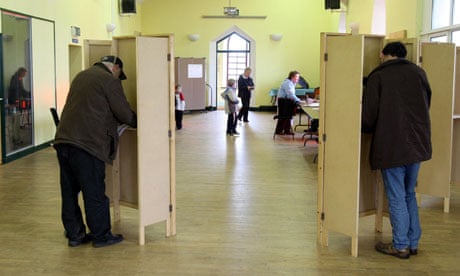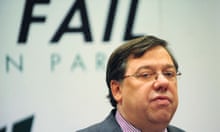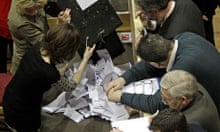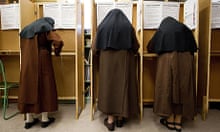Afternoon calm in the well-scrubbed north Dublin suburb of Glasnevin was broken by a slanging match between rival campaigns. It happens in elections everywhere. Yet to no one's surprise, this pavement squabble in Ireland's tense 2011 election was between supporters of the same party.
Fighting for vital second preferences in the country's single transferable vote (STV) system can pit colleagues against each other when support is collapsing, as it is for Fianna Fáil, the governing party of the great banking crash of 2008.
"Why are you canvassing so close to the polling station when it's illegal?" a supporter of Fianna Fáil's Mary Fitzpatrick shouted at two younger men clutching leaflets for the party's Cyprian Brady in their hands. As the pair half-heartedly protested innocence, he screamed: "Fianna Fáil could be wiped out in Dublin and we have a chance in this seat."
"Calm down, we all have Fianna Fáil's best interests at heart," replied the Brady bunch. "No you don't, or you wouldn't be doing this," countered the Fitzpatrick activist, who then called the police on his mobile. The Garda arrived within minutes and calmed both sides down. Such are the dynamics of STV, which gives voters a more sophisticated range of options than Britain's proposed AV reform.
As disaffected Fianna Fáil voters in Glasniven were deciding whether to spare either – or neither – local Fianna Fáil candidate, the Fine Gael leader and taoiseach-in-waiting, Enda Kenny, was urging supporters to vote tactically too. After a quietly competent campaign (no disasters) and a late surge to 40% (Fianna Fáil is on 15%; Labour 18%; Sinn Féin 10%), ex-teacher Kenny is within reach of a clear 83-seat majority in the Dáil – though not quite there.
Wise heads are telling him that another coalition with "high tax" Labour, always uneasy bedfellows, would be the best option given Ireland's economic troubles. The arguments are familiar to Lib-Con coalition Britain and the two parties' attacks have softened as the vote counting looms.
But in a real sense, incestuous political feuding like the spat in Glasnevin has long been a wider problem with mainstream Irish politics. Fianna Fáil and Fine Gael are both parties of the right, nursing old historic quarrels but not offering voters sufficient choice, even after the disastrous bank bust of 2008.
Across Ireland yesterday, up to 3.2 million voters in 43 multi-member constituencies were picking 165 TDs (MPs) from among 566 candidates. But if voters emerging from St Columbia's school polling station, Glasnevin – or down the road in poorer Phibsborough – are any guide, they were doing so without much enthusiasm.
"I voted for leftwing independents," said Róisín Beirne, 24, a sculptor who lives in working-class-but-gentrifying Phibsborough. In 2007, when Fianna Fáil's Bertie Ahern unexpectedly beat Kenny just before the Celtic Tiger boom exploded, Beirne included Greens and Fine Gael candidates in the mix. No longer. "Voting for Fine Gael or Labour isn't change, it's the same. I'm not sure I have any faith in their ability to run the economy."
Older people were more likely to stick with old loyalties. "I've always voted Fianna Fáil and I did again. I don't like Enda Kenny, he's not honest, and they're all to blame. Someone should have told the banks to stop lending," said Kathleen Duignan, 82 outside All Saints Presbyterian church polling station.
In Glasniven, 83-year-old Ann Watters says much the same, except she's a life-long Fine Gael voter. "The banks and the politicians were hand in hand."
But the old fear for their country and the burden the crisis has bequeathed to Ireland's young. When the Fianna Fáil government, led by Brian Cowen, rashly underwrote all the debts of tottering Irish banks after Lehman Brothers crashed, it turned a financial crisis into a sovereign debt crisis and Ireland into what its media routinely calls "a colony of Brussels". Some voters have decided they prefer Europe to the crony government at home.
Though the campaign has shed disappointingly little light on realistic options ahead, the financial numbers are scary. After 2000 the early Celtic Tiger years became a property-led speculative bubble, made worse by weak planning laws and 300,000 too many new homes. The crash saw GDP collapse by 11%, unemployment triple to 13.3% and government debt quadruple to 95%, which will rise to 125% by 2014 on IMF estimates.
Labour's leader Eamon Gilmore, likely deputy PM next week, has been criticised for saying that the EU/IMF renegotiation, which all parties agree must follow the election, must be on "Ireland's terms, not Frankfurt's". But even the austere Financial Times argues that, if Germany wants to prevent an Irish default on its debts (for fear of wider eurozone contagion), it should share Ireland's burden; Dublin's debt disaster is also the fault of European lenders.
In busy Phibsborough Road, in sight of idle cranes and boarded-up shops, unemployed electrician, Michael Maher, 24, and his fiancee, Emma Mullen, can't wait for the EU summits. They voted for independents and Sinn Féin, protest votes for individual candidates they admire. But the couple are already planning to follow an old Irish tradition by emigrating to Canada or Australia.
As the polls closed , Dublin's recycling centre publicly crushed a BMW that once belonged to a banker who helped wreck the economy. It may make voters feel better – but for how long?
High turnout
Irish polling stations were expected to record one of the highest turnouts in recent history, with voters intent on punishing the government for its mismanagement of the financial crisis.
By mid-afternoon in Dublin, nearly a third of the electorate had already voted, with most constituencies elsewhere reporting that up to 30% of those eligible to vote had turned up.
Just over 3.2 million people are entitled to vote in the Republic. They make up 43 constituencies voting to elect 165 of the 166 MPs (the chairman, Seamus Kirk, is automatically returned to the chamber without having to stand for election). Fine Gael needs 83 seats to secure an overall majority, but opinion polls suggest it will just fall short.
Henry McDonald





